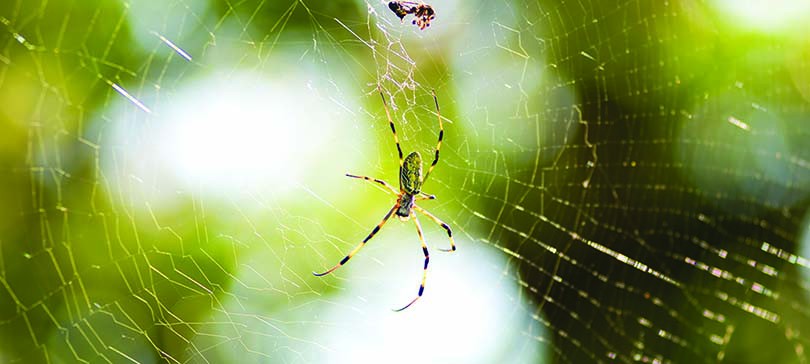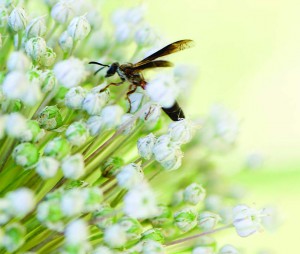By Kristen Hannum
I heard that a neighbor was considering widespread outdoor spraying to get rid of the “yucky” spiders in the trees, it’s difficult to exaggerate my despair.
The web of life, after all, doesn’t exclude spiders. Even big ones. Or any other creepy, crawly beastie.
The contrast between her view of spiders and that of master gardeners couldn’t be greater.
I knew that most of the insects and spiders in our gardens were harmless bird food — even beneficial — but I had no idea that it was upward of 90 percent. When we spray with pesticides (or herbicides, for that matter), it’s the equivalent of turning to the Dark Side, dealing out death instead of life. The collateral damage is unacceptable.
The lovely ladybug and her voracious appetite for aphids is the poster bug for this disregarded truth. Except we even get ladybugs wrong: it’s ladybug larvae that do most of the aphid eating, and those larvae qualify as homely. Yucky, even.
Similarly, lacewings are so delicate and pretty that they surely win over even the staunchest insect-hater. Unfortunately, their larvae aren’t as appealing. Again, it’s the larvae, which we call aphid lions, that gobble up aphids.
There are all kinds of beneficial beetles in addition to the pretty little ladybugs. Those of us who grew up in the manicured suburbs just need to adjust our mind-set.
Some other fabulous insect garden guards are the unfortunately named parasitic wasps (that just means they do not sting) and assassin bugs, including the amazing wheel bugs, which have a kind of spiny wheel on their backs that looks straight out of “Jurassic Park.” Assassin bugs kill caterpillars and just about anything else they can catch. If you pick them up for a better look, however, their bites reportedly make a bee sting instantly forgettable. Assassin bugs feast on hornworms, Mexican bean beetles, Colorado potato beetles, cucumber beetles and more. They’re on your team.
It goes without saying that all the little pollinating insects are indispensable for your garden. Pollinators aren’t just honeybees. As hard as honeybees work, their wild cousins — who sometimes look more like little flies than bees — do just as much and even more pollinating. Other pollinators include moths, wasps, beetles and butterflies. And if you like butterflies, you need to develop an appreciation for caterpillars, maybe even plant a milkweed or three for those dwindling numbers of monarch butterflies.
Then there are bugs like roly-poly bugs and ground beetles, that, together with centipedes, millipedes and worms, shred organic matter like rotting leaves and are part of the decomposing process. Think of them as living fertilizer factories and garden “cleaner-uppers” all in one, keeping our world from piling up with dead trees, squirrels and everything else. They do the work, we get the rich soil.
For a while people thought they could replace this miniature world of life with chemical fertilizers. We have learned better.
Don’t get me wrong. A fat fly just cheekily dive-bombed me and I’m trying to remember where the swatter is. My spiders will take too long.
As for my neighbor’s spraying program against the spiders, it hasn’t happened. I spent hours compiling information from the Web that showed her that spiders aren’t harmful. I’m still uneasy, but for now she and the spiders are coexisting.


